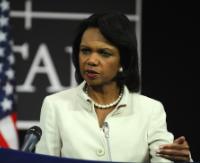When all was said and done, Secretary of State Condoleezza Rice got scant comfort from NATO on her mission to press punitive action against Russia following its armed incursion into Georgia -- and its slowness in leaving it. True, the North Atlantic alliance foreign ministers meeting in Brussels Tuesday did manage to adopt a united position -- but at the price of tepid language and of retaliatory steps that fell short of what the Bush administration had urged. President Dmitry Medvedev signed an agreement that requires Russian troops to return to positions held before the fighting broke out on Aug. 7. There is little sign of Russian compliance on the ground, and in Brussels Rice pressed NATO members to at least threaten Russia with unspecified "consequences." The Americans also called for a formal suspension of the NATO-Russia Council established in 2002 to increase cooperation on issues of defense, military and international security. For example, at a recent council meeting on June 13, the Russians had offered to contribute a navy vessel to the alliance's stop-and-search anti-terrorism operations on the high seas. A Russian submarine had also taken part in NATO search and rescue operations.
NATO’S Tepid Response to Russia is Europe’s Choice

